外研版(2019)选择性必修 第四册Unit 6 Space and beyond Vocabulary & Starting out课件(共22张PPT)
文档属性
| 名称 | 外研版(2019)选择性必修 第四册Unit 6 Space and beyond Vocabulary & Starting out课件(共22张PPT) |
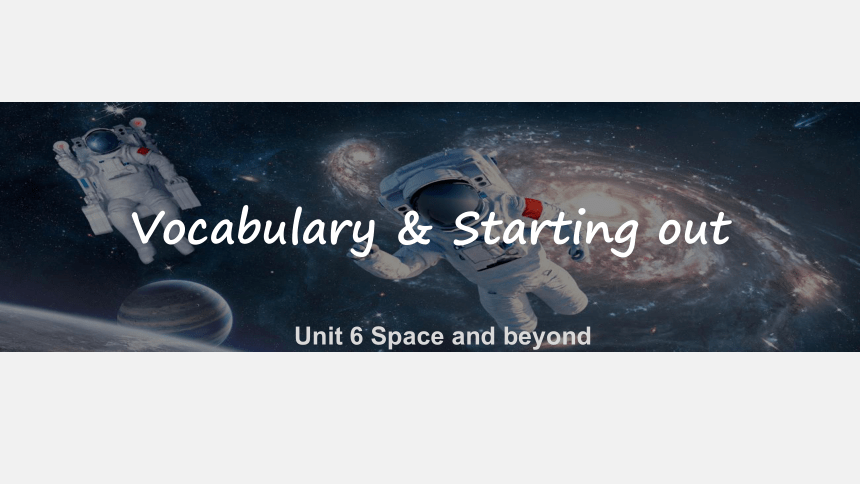
|
|
| 格式 | pptx | ||
| 文件大小 | 74.4MB | ||
| 资源类型 | 教案 | ||
| 版本资源 | 外研版(2019) | ||
| 科目 | 英语 | ||
| 更新时间 | 2024-04-27 00:00:00 | ||
图片预览

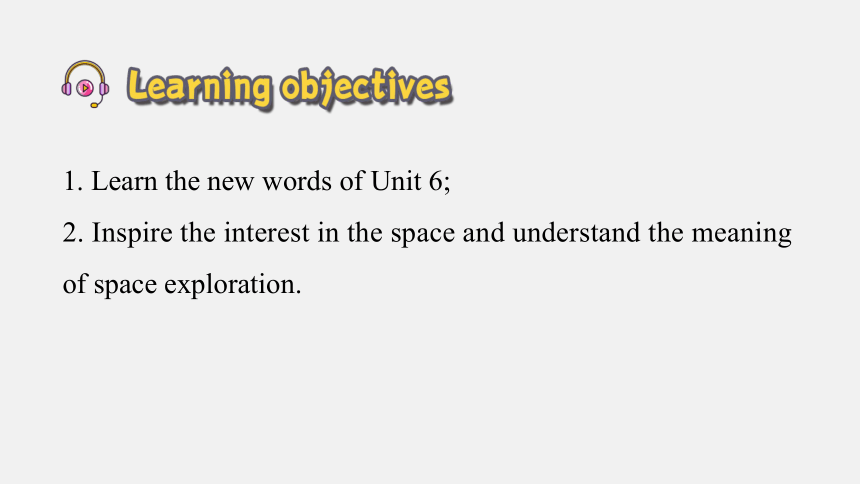
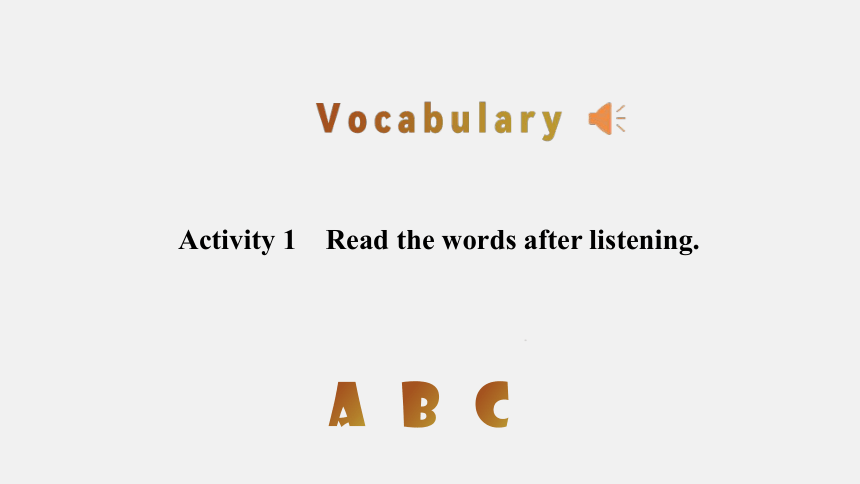
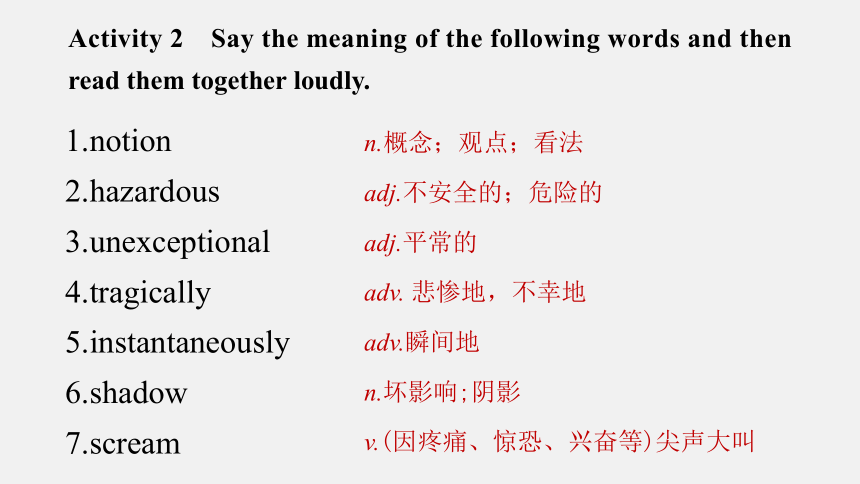
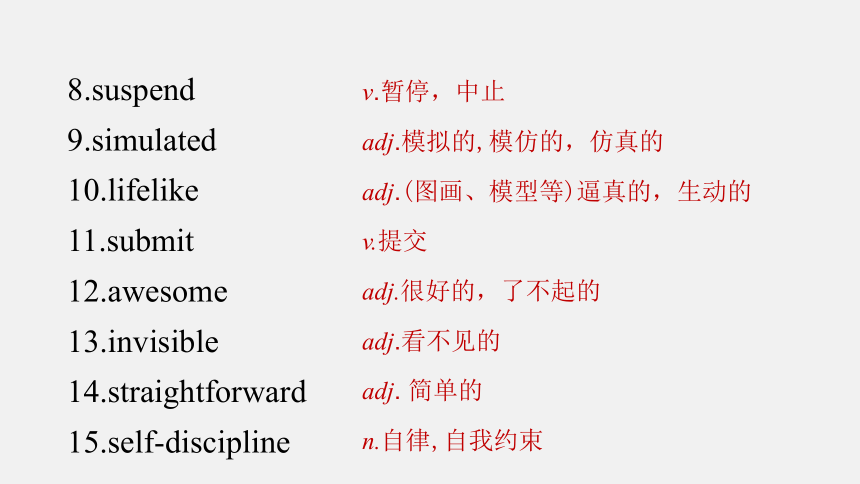
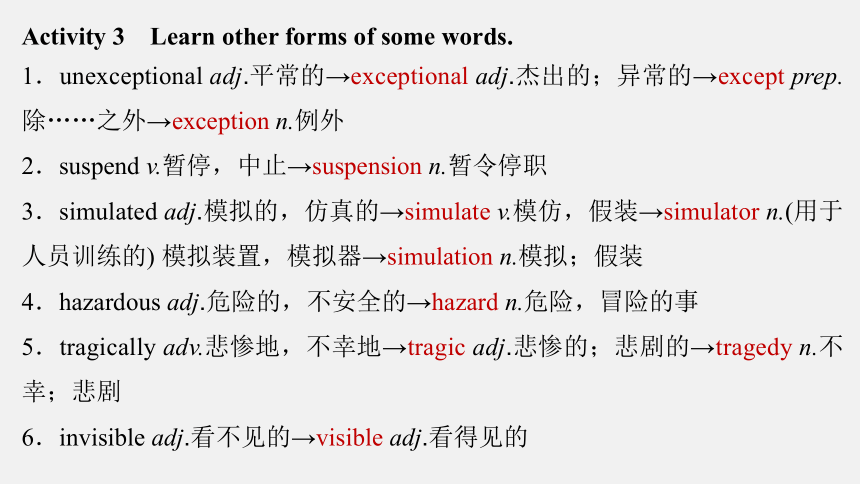
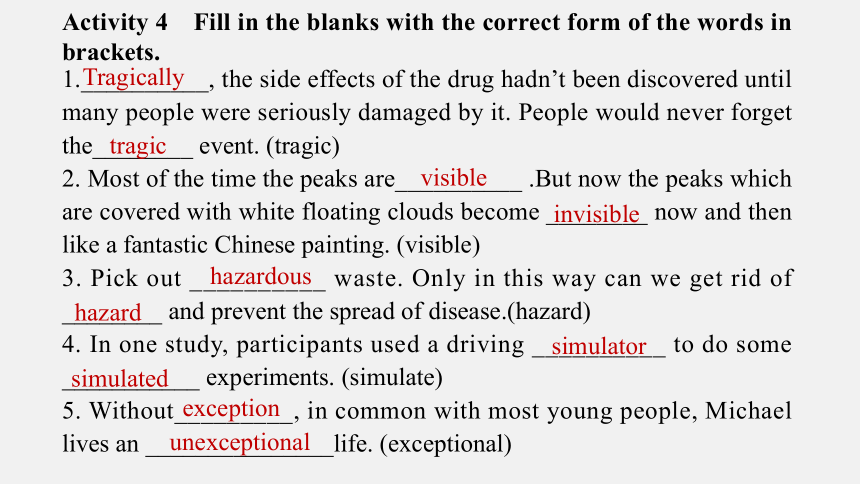
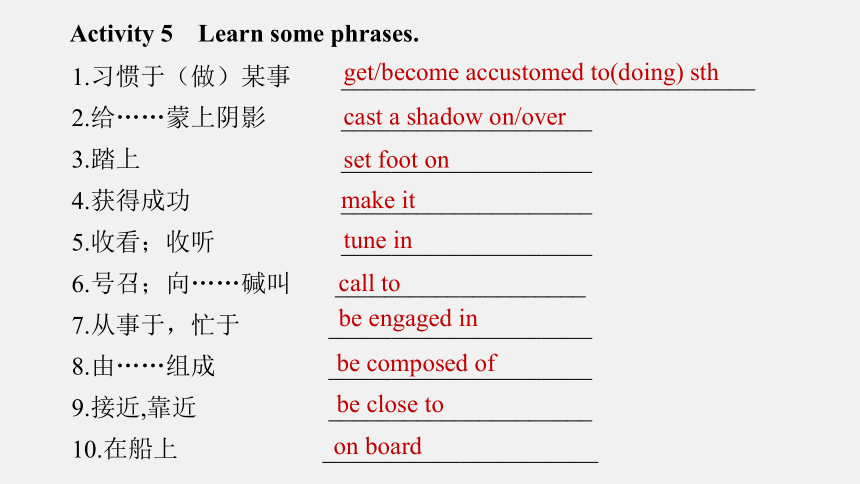
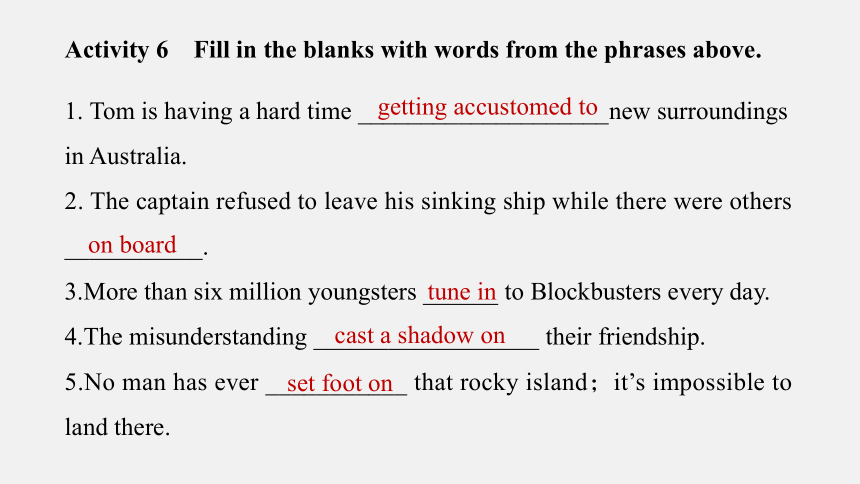
文档简介
(共22张PPT)
Vocabulary & Starting out
Unit 6 Space and beyond
1. Learn the new words of Unit 6;
2. Inspire the interest in the space and understand the meaning of space exploration.
Activity 1 Read the words after listening.
1.notion
2.hazardous
3.unexceptional
4.tragically
5.instantaneously6.shadow
7.scream
n.概念;观点;看法
adj.不安全的;危险的
adj.平常的
adv. 悲惨地,不幸地
adv.瞬间地
n.坏影响;阴影
v.(因疼痛、惊恐、兴奋等)尖声大叫
Activity 2 Say the meaning of the following words and then read them together loudly.
8.suspend
9.simulated
10.lifelike
11.submit
12.awesome
13.invisible
14.straightforward
15.self-discipline
v.暂停,中止
adj.模拟的,模仿的,仿真的
adj.(图画、模型等)逼真的,生动的
v.提交
adj.很好的,了不起的
adj.看不见的
adj. 简单的
n.自律,自我约束
1.unexceptional adj.平常的→exceptional adj.杰出的;异常的→except prep.除……之外→exception n.例外
2.suspend v.暂停,中止→suspension n.暂令停职
3.simulated adj.模拟的,仿真的→simulate v.模仿,假装→simulator n.(用于人员训练的) 模拟装置,模拟器→simulation n.模拟;假装
4.hazardous adj.危险的,不安全的→hazard n.危险,冒险的事
5.tragically adv.悲惨地,不幸地→tragic adj.悲惨的;悲剧的→tragedy n.不幸;悲剧
6.invisible adj.看不见的→visible adj.看得见的
Activity 3 Learn other forms of some words.
1.__________, the side effects of the drug hadn’t been discovered until many people were seriously damaged by it. People would never forget the________ event. (tragic)
2. Most of the time the peaks are__________ .But now the peaks which are covered with white floating clouds become ________ now and then like a fantastic Chinese painting. (visible)
3. Pick out __________ waste. Only in this way can we get rid of ________ and prevent the spread of disease.(hazard)
4. In one study, participants used a driving __________ to do some ___________ experiments. (simulate)
5. Without_________, in common with most young people, Michael lives an _______________life. (exceptional)
Tragically
tragic
visible
invisible
hazardous
hazard
simulated
simulator
unexceptional
exception
Activity 4 Fill in the blanks with the correct form of the words in brackets.
1.习惯于(做)某事 _________________________________
2.给……蒙上阴影 ____________________
3.踏上 ____________________
4.获得成功 ____________________
5.收看;收听 ____________________
6.号召;向……碱叫 ____________________
7.从事于,忙于 _____________________
8.由……组成 _____________________
9.接近,靠近 _____________________
10.在船上 ______________________
get/become accustomed to(doing) sth
cast a shadow on/over
set foot on
make it
tune in
call to
be engaged in
be composed of
be close to
on board
Activity 5 Learn some phrases.
1. Tom is having a hard time ____________________new surroundings in Australia.
2. The captain refused to leave his sinking ship while there were others ___________.
3.More than six million youngsters ______ to Blockbusters every day.
4.The misunderstanding __________________ their friendship.
5.No man has ever ___________ that rocky island;it’s impossible to land there.
getting accustomed to
on board
tune in
cast a shadow on
set foot on
Activity 6 Fill in the blanks with words from the phrases above.
In the space, which planet do we live in
What are other planets
EARTH
Earth is one of the planets in the solar system.
Before you watch
2. What are other planets
Let’s see whether you remember their order and names!
“We all ________ the sun.”
orbit
Let’s learn more about the solar system
While you watch
Activity 1 Watch and Answer
Where are the Asteroid Belt and the Kuiper Belt in the solar system
the Asteroid Belt
the Kuiper Belt
Where are the Asteroid Belt and the Kuiper Belt in the solar system
The Asteroid Belt lies between Mars and Jupiter. The Kuiper Belt exists just beyond the orbit of Neptune.
Activity 2 Watch and Think
How was the Sun formed?
How was the Sun formed?
First, enough gas and dust pulls together to make a disc where the planets are formed. Then, building pressure heats up the center of the disc to one million degrees, and a nuclear reaction begins, which forms the Sun.
Activity 1 Look, Think and Say
1.Which of these spacecraft had a human on board when launched
2.What are the recent events in China’s space programme
After you watch
Activity 2 Discussion
What do you know about China’s future plans for space exploration
The Solar System
Where do planets come from The answer lies in the stars, or at least in the birthplaces of the stars, 1.______ are vast clouds of gas and dust, scattered through space. Our Sun was born in such a place, more than four and a half billion years ago. This is how it happened. 2._________(attract) by its gravity, enough gas and dust pulls itself together into a disc. Inside the disc, solid pieces come together—each one growing as it takes in more material and eats up smaller neighbors. The winners will become the planets. Meanwhile, building pressure heats up the center of the disc to one million degrees—hot enough for nuclear reactions to begin. In a flash, the young Sun turns itself on, blowing the disc away, starting 3._____ infant solar system.
which
Attracted
an
Activity 3 Complete the passage and read it carefully
Our solar system can 4.____________(divide) into three distinct parts made of rock, gas and ice.
And just like the Asteroid Belt marks the boundary between the rocky and gas planets, astronomers now believe a similar region 5._______(call) “the Kuiper Belt” exists just beyond the orbit of Nepture, the last of the gas planets. Because it’s so far from the Sun’s 6._________(warm), anything in this Belt is rich in ice and 7.________(freeze) gas.
One thousand times 8.________(far) away than the Kuiper Belt, hundreds of billions of comets drift at the edge of the solar system. 9.____________(occasion), the Sun’s gravity pulls some comets closer, allowing us to see them and study them, letting scientists learn more about the 10.____________(begin) of our solar system.
farther
be divided
frozen
called
warmth
beginnings
Occasionally
There is no easy way from the earth to the stars and the universe is full of magical things, patiently waiting for our wits to grow sharper.
1.Read the words fluently and memorize them.
2.Preview the text.
Homework
Vocabulary & Starting out
Unit 6 Space and beyond
1. Learn the new words of Unit 6;
2. Inspire the interest in the space and understand the meaning of space exploration.
Activity 1 Read the words after listening.
1.notion
2.hazardous
3.unexceptional
4.tragically
5.instantaneously6.shadow
7.scream
n.概念;观点;看法
adj.不安全的;危险的
adj.平常的
adv. 悲惨地,不幸地
adv.瞬间地
n.坏影响;阴影
v.(因疼痛、惊恐、兴奋等)尖声大叫
Activity 2 Say the meaning of the following words and then read them together loudly.
8.suspend
9.simulated
10.lifelike
11.submit
12.awesome
13.invisible
14.straightforward
15.self-discipline
v.暂停,中止
adj.模拟的,模仿的,仿真的
adj.(图画、模型等)逼真的,生动的
v.提交
adj.很好的,了不起的
adj.看不见的
adj. 简单的
n.自律,自我约束
1.unexceptional adj.平常的→exceptional adj.杰出的;异常的→except prep.除……之外→exception n.例外
2.suspend v.暂停,中止→suspension n.暂令停职
3.simulated adj.模拟的,仿真的→simulate v.模仿,假装→simulator n.(用于人员训练的) 模拟装置,模拟器→simulation n.模拟;假装
4.hazardous adj.危险的,不安全的→hazard n.危险,冒险的事
5.tragically adv.悲惨地,不幸地→tragic adj.悲惨的;悲剧的→tragedy n.不幸;悲剧
6.invisible adj.看不见的→visible adj.看得见的
Activity 3 Learn other forms of some words.
1.__________, the side effects of the drug hadn’t been discovered until many people were seriously damaged by it. People would never forget the________ event. (tragic)
2. Most of the time the peaks are__________ .But now the peaks which are covered with white floating clouds become ________ now and then like a fantastic Chinese painting. (visible)
3. Pick out __________ waste. Only in this way can we get rid of ________ and prevent the spread of disease.(hazard)
4. In one study, participants used a driving __________ to do some ___________ experiments. (simulate)
5. Without_________, in common with most young people, Michael lives an _______________life. (exceptional)
Tragically
tragic
visible
invisible
hazardous
hazard
simulated
simulator
unexceptional
exception
Activity 4 Fill in the blanks with the correct form of the words in brackets.
1.习惯于(做)某事 _________________________________
2.给……蒙上阴影 ____________________
3.踏上 ____________________
4.获得成功 ____________________
5.收看;收听 ____________________
6.号召;向……碱叫 ____________________
7.从事于,忙于 _____________________
8.由……组成 _____________________
9.接近,靠近 _____________________
10.在船上 ______________________
get/become accustomed to(doing) sth
cast a shadow on/over
set foot on
make it
tune in
call to
be engaged in
be composed of
be close to
on board
Activity 5 Learn some phrases.
1. Tom is having a hard time ____________________new surroundings in Australia.
2. The captain refused to leave his sinking ship while there were others ___________.
3.More than six million youngsters ______ to Blockbusters every day.
4.The misunderstanding __________________ their friendship.
5.No man has ever ___________ that rocky island;it’s impossible to land there.
getting accustomed to
on board
tune in
cast a shadow on
set foot on
Activity 6 Fill in the blanks with words from the phrases above.
In the space, which planet do we live in
What are other planets
EARTH
Earth is one of the planets in the solar system.
Before you watch
2. What are other planets
Let’s see whether you remember their order and names!
“We all ________ the sun.”
orbit
Let’s learn more about the solar system
While you watch
Activity 1 Watch and Answer
Where are the Asteroid Belt and the Kuiper Belt in the solar system
the Asteroid Belt
the Kuiper Belt
Where are the Asteroid Belt and the Kuiper Belt in the solar system
The Asteroid Belt lies between Mars and Jupiter. The Kuiper Belt exists just beyond the orbit of Neptune.
Activity 2 Watch and Think
How was the Sun formed?
How was the Sun formed?
First, enough gas and dust pulls together to make a disc where the planets are formed. Then, building pressure heats up the center of the disc to one million degrees, and a nuclear reaction begins, which forms the Sun.
Activity 1 Look, Think and Say
1.Which of these spacecraft had a human on board when launched
2.What are the recent events in China’s space programme
After you watch
Activity 2 Discussion
What do you know about China’s future plans for space exploration
The Solar System
Where do planets come from The answer lies in the stars, or at least in the birthplaces of the stars, 1.______ are vast clouds of gas and dust, scattered through space. Our Sun was born in such a place, more than four and a half billion years ago. This is how it happened. 2._________(attract) by its gravity, enough gas and dust pulls itself together into a disc. Inside the disc, solid pieces come together—each one growing as it takes in more material and eats up smaller neighbors. The winners will become the planets. Meanwhile, building pressure heats up the center of the disc to one million degrees—hot enough for nuclear reactions to begin. In a flash, the young Sun turns itself on, blowing the disc away, starting 3._____ infant solar system.
which
Attracted
an
Activity 3 Complete the passage and read it carefully
Our solar system can 4.____________(divide) into three distinct parts made of rock, gas and ice.
And just like the Asteroid Belt marks the boundary between the rocky and gas planets, astronomers now believe a similar region 5._______(call) “the Kuiper Belt” exists just beyond the orbit of Nepture, the last of the gas planets. Because it’s so far from the Sun’s 6._________(warm), anything in this Belt is rich in ice and 7.________(freeze) gas.
One thousand times 8.________(far) away than the Kuiper Belt, hundreds of billions of comets drift at the edge of the solar system. 9.____________(occasion), the Sun’s gravity pulls some comets closer, allowing us to see them and study them, letting scientists learn more about the 10.____________(begin) of our solar system.
farther
be divided
frozen
called
warmth
beginnings
Occasionally
There is no easy way from the earth to the stars and the universe is full of magical things, patiently waiting for our wits to grow sharper.
1.Read the words fluently and memorize them.
2.Preview the text.
Homework
